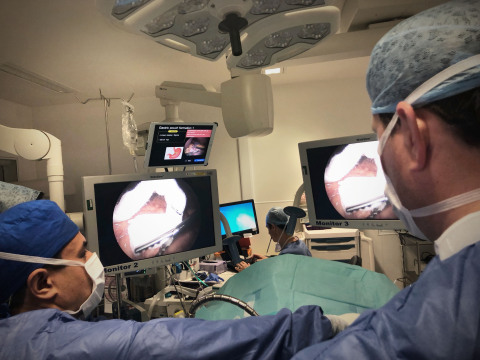Digital Surgery (LONDON), a health tech company shaping the future of surgery through the convergence of surgical expertise and technology, today announced it has developed and successfully demonstrated the world’s first real-time, dynamic artificial intelligence (AI) system designed for the operating room (OR).
The company is building the data to power the future of surgery through its world-class and proprietary surgical procedure road maps, which aim to aid the surgical team in the OR, reducing risk and making surgery safer. Digital Surgery is the first patented AI platform bringing this scale of knowledge to the surgical community.
“The impact of a technology leap like this is astounding. Digital Surgery is creating the technologies that will drive the ‘integrated ORs’ and robotic systems of the future.”
“This is a huge milestone for the future of surgery because it lays the foundation for how AI and computer vision will support surgical teams to deliver safer surgeries. It also enables the next generation of robotic surgery, giving these future systems the capability to function more intelligently and safely,” said Dr. Jean Nehme MD, co-founder and CEO of Digital Surgery.
“We have already developed AI algorithms for multiple procedures across bariatrics and other surgical specialties like orthopedics, and our library will continue to grow. With AI, we have the unique ability to scale global surgical best practices.”
More than 5 billion people do not have access to safe surgical care, with surgical knowledge being one of the critical factors that hasn’t been able to scale globally. Addressing this problem will require emerging technologies, including AI, particularly given other technological alternatives, like robotics and telemedicine platforms, require expensive equipment or resources that limit their scalability.
Digital Surgery’s AI platform can provide road maps and act as a navigational system for every OR and surgery center, addressing the countless variables that surgical teams face — from staff turnover, language, culture, tools, resources, to the training and skill level of the surgical team. The AI recognizes what is happening during surgery through a camera view, and cross-checks and correlates the anatomy and actions against the largest library of surgical road maps. The OR team can then see in real time the platform analyzing and predicting next steps.
Quotes from leading surgeons
- “What Digital Surgery has done with this technology feels like a comparison with the advent of laparoscopy, which was a truly disruptive and groundbreaking revolution and paradigm shift in surgery. This resulted in a huge change in approach from maximally invasive to minimally invasive surgery. In the next five years, I expect there to be a transformation from non-AI to AI supported surgery as common practice, benefiting training, patient safety, data collection and outcomes analysis. This is something my OR teams, clinical teams and I would look forward to and will truly impact patient care.” — Dr. Sanjay Purkayastha, Consultant Laparoscopic, Bariatric & Robotic Surgeon, Imperial College Healthcare NHS Trust and Clinical Senior Lecturer at Imperial College London.
- “The impact of a technology leap like this is astounding. Digital Surgery is creating the technologies that will drive the ‘integrated ORs’ and robotic systems of the future.” — Dr. Daniel Buchbinder, Mount Sinai School of Medicine
The team at Digital Surgery is best known for its leading mobile surgical training app, Touch Surgery, which is embedded in more than 160 residency programs and used by more than 2 million surgeons, healthcare professionals and others globally. Touch Surgery has more than 200 surgical simulations across 14 specialties, and it has been validated by 15 peer-reviewed publications for its approach to virtual surgical training.
About Digital Surgery
Digital Surgery, founded by surgeons for surgeons and healthcare professionals, believes safe surgical care should be accessible for all. Co-founders Dr. Jean Nehme and Dr. Andre Chow set out to shape the future of surgery by building a digital ecosystem that sits at the intersection of surgical expertise and technology.

